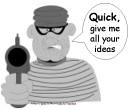Johnny Cash's Journey Through the Other Side of Virtue - New York Times
| Johnny Cash wasn't nearly as handsome as Elvis. His singing voice, while deep and rich, had a tendency to wander off-key. He was the first to admit that he knew very few guitar chords. If performers could be weighed and measured like prizefighters, Cash might have left the oddsmakers in stitches.
Yet there is a power and honesty to his music that few recording artists can match. In his most affecting songs, the gravelly, toxic rumble you hear is Johnny Cash locking horns with his dark side. It's one man's fight for his own soul, a timeless struggle to a rockabilly beat.Just over two years after Cash's death at age 71, the American music legend has returned for an encore in 'Walk the Line,' a film named for one of his signature songs. While the movie revolves mainly around his tangled, forbidden courtship with his eventual second wife, June Carter, it opens at Folsom Prison in California. Inside the penitentiary's walls in 1968 Johnny Cash recorded the live album that for many fans defines the macabre Man in Black, his band's railroad rhythm churning behind him as he sings, 'I shot a man in Reno just to watch him die.' High on amphetamines, this self-proclaimed pioneer of hotel vandalism once took an ax and chopped a brand-new door through the wall of his room. In another drug-induced fit he smashed all the footlights at a Grand Ole Opry show at Ryman Auditorium with his microphone stand. In the second of his two autobiographies, 'Cash,' he wrote that he dwelt on 'the literal meaning of 'hell-bent. ' ' If all Johnny Cash brought to the stage were his demons, we wouldn't need to remember him. Marilyn Manson, the shock rocker, proved far more grotesque than a man in a black suit singing a few country murder ballads. Cash's drug addiction and light brushes with the law pale beside the rapper 50 Cent's drug deals and bullet scars. It is the angel on Johnny Cash's other shoulder that gives his music its depth and profundity. That same murderer in 'Folsom Prison Blues' is penitent, singing: 'Well, I know I had it coming. I know I can't be free.' Cash himself summed it up that he was 'trying, despite my many faults and my continuing attraction to all seven deadly sins, to treat my fellow man as Christ would.' Johnny Cash merges our seemingly contradictory American traditions of outlaws prone to wild gunplay and pious Christians singing hymns, without stopping to explain how you can be both at once.He left the fold at Sun Records because the impresario Sam Phillips wouldn't let him record gospel music. He went a big step further than that, eventually recording an audio version of the New Testament. This was a man who could comfortably recall playing host to the Rev. Billy Graham and killing a crocodile named One Eyed Jack on the same page of his autobiography." |
 The (Art) Thief
The (Art) Thief

Comments on "Johnny Cash's Journey Through the Other Side of Virtue - New York Times"
post a comment